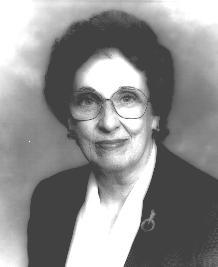Page 191
[Begin Tape 1, Side A]
Clark: Today is February the 26th, 1994. I just plagiarized Eileen Shanahan.
Shanahan: I've got better stuff than that to steal.
Clark: This is Mary Marshall Clark. I know I don't sound like myself. For once I have a husky, movie-star voice because I have laryngitis. We're meeting at the Columbia Oral History Research Office, actually, to do the next session of Eileen's oral history.
Today we're going to talk about HEW.
Shanahan: One of the things that it seems to me to be worth a little thinking about and talking about is the press that covered HEW and how the press, I came to realize, had changed to some significant degree between the Kennedy years when I was in the Treasury Department and by the time we gotóa little more than ten years laterówell, more like fifteen years later when I got to HEW. I didn't recognize it as such at the time, that we were on the road already to the "gotcha" days of today and the sleaze days of today. We weren't all the way there, by any means. We were certainly into the early days of the "gotcha" journalism, everybody in government is a bastard, a son-of-a-bitch, a liar, a crook, a womanizer and a thief, and we're going to getcha. The sleaze hadn't come to the fore yet but it had changed.
And I didn't recognize that until several things happened to meóor to usóone of which was the so-called chef story. Now that story is not made up out of whole cloth. There was some fault there and the fault was Califano's to a significant extent. As the story hitóand it was written by a guy named Mike Putzell of the AP.
Clark: Just explain what the story was, for the sake of theó
Shanahan: That's what I'm going to say. When the story hit, they said that Califano had hired a chef and was paying him, I forget what it was. It was not a sum of money that should knock anybody's eyes out. I don't remember what it was. The dollar figure wouldn't mean anything in these inflated days, anyway. And that he had tried to pass him off as a confidential assistant to justify the salary. Well, that is true. The job was written up as confidential assistant and the effort was made to make it sound all right by saying, "Well, of course, you know, he would be serving as well as cooking in the secretary's dining room and the secretary might be having the Speaker of the House to lunch and people like that where confidential things were discussed." That was all true. But not enough of an excuse for calling him a confidential assistant, in my view.
In any event, the story was written, the story went out, and it was an absolute firestorm with everybody calling up wanting to know about the chef. The guy was no chef, he was a cook, he was an Army cook, he was a retired sergeant that I guess Califano had met. People forget Califano was in the Pentagon in the early Kennedy administration as McNamara's top civilian aide. And I guess that's where Califano knew him from.
I tried to respond to the story and I made a big mistake. I should have put poor Wiley, the cook, who was just hiding in the corners by thenóI don't remember his last name; we'll get itóI should have put him up before the press and they would have known that he wasn't any chef and he was a cook. The reason Califano had to hire a cook was, at that time, every department had a secretary's dining room and a staff. And the only reason he had to hire one was that the old one had retired. And that point was never made in the original story

